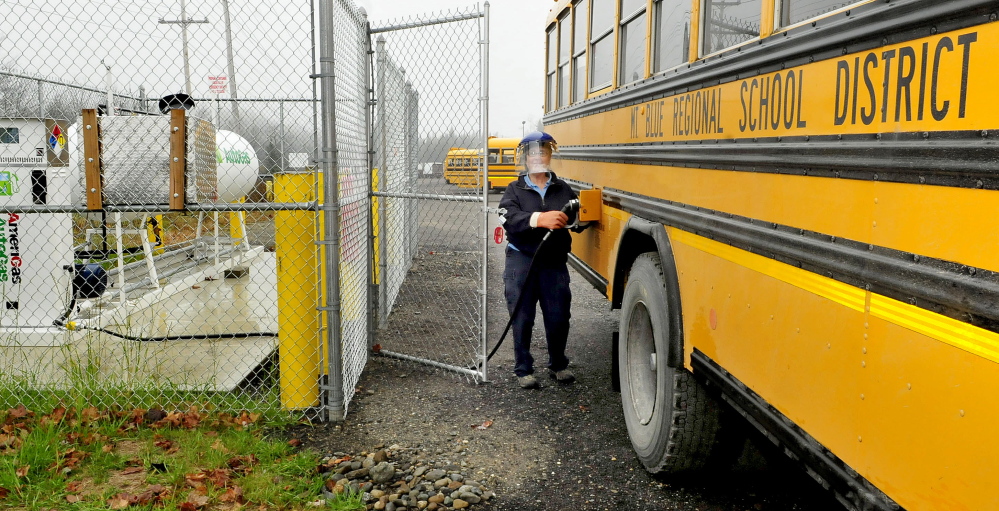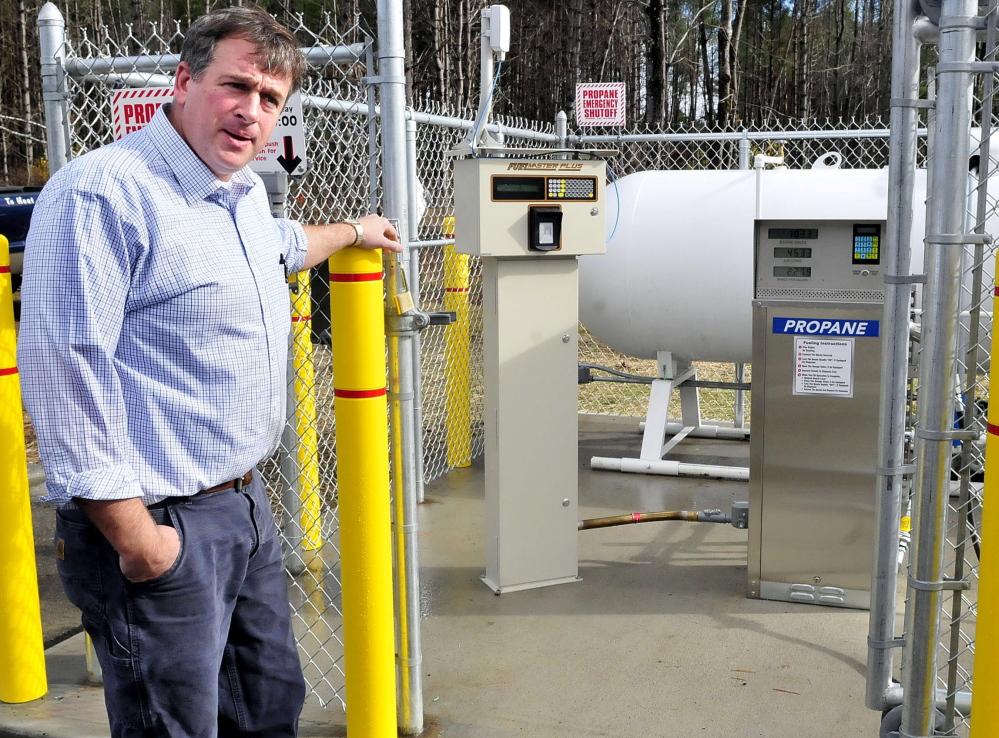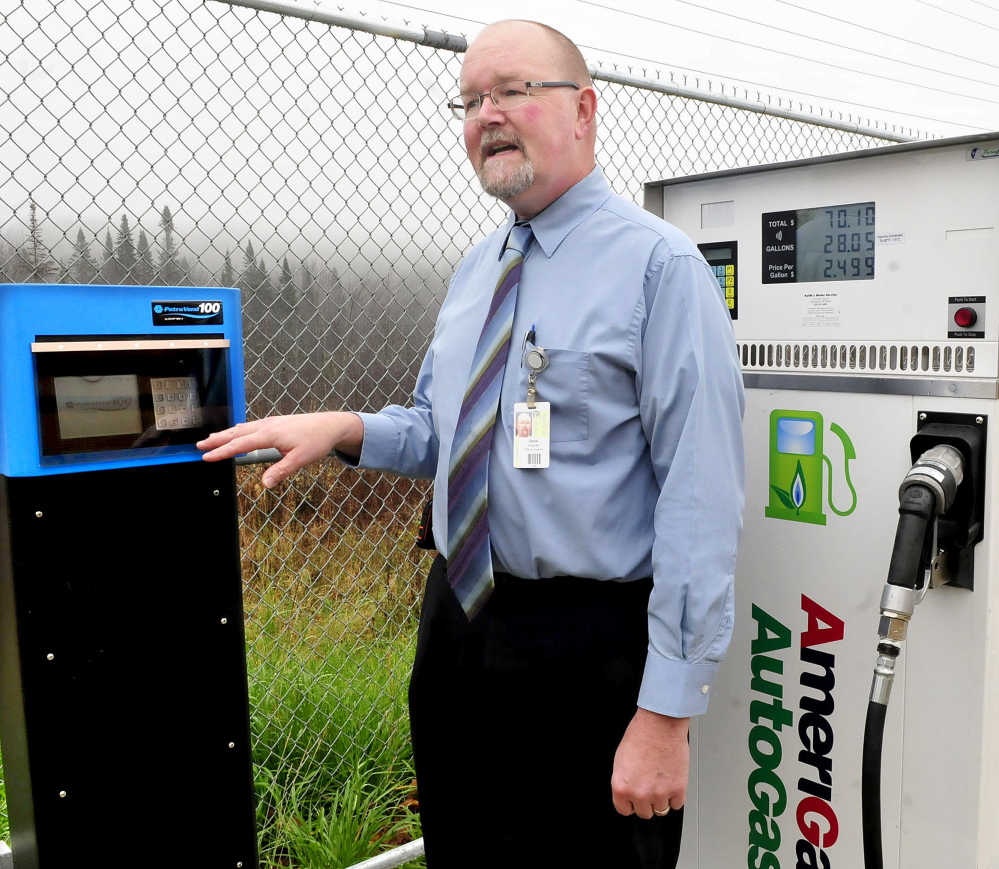A half dozen buses in central Maine are now running on liquid propane — a cheaper, quieter and comparatively greener fuel source that’s rare but catching on.
Madison and Farmington based school districts received grants this school year to switch a total of seven buses to take propane. A Madison business, Bob’s Cash Fuel, received a town grant to help build a fueling station to cater to buses and anyone else who adopts the fuel.
In Farmington, David Leavitt, director of support services for Regional School Unit 9, said replacing four of their buses with ones that use propane was part of the school district’s efforts to adopt “greener” fuel sources like wood pellet boilers and ground source heating and cooling.
“It’s American made, and it doesn’t have the pollution that diesel does,” he said. “It’s also astronomical how quiet the buses are compared to the old ones.”
To fuel the buses, Leavitt said the drivers had to go through some additional training. The propane pump attaches like a diesel pump, though it must be screwed onto the bus before fueling, so propane doesn’t leak or spill. The liquid propane is cold — minus 44 degrees — so as a precaution the drivers wear a protective mask and thick gloves that are kept at the fueling station.
Leavitt said the propane-fueled buses cost about $90,000 each, but the school received grants for $15,165 per bus to cover the difference in cost from a diesel bus. In order to receive the grant, Leavitt said the school agreed to destroy the outgoing diesel buses, drilling holes in the engine block and tearing the roof and sides into pieces of scrap.
The school was granted the bus funding through the Department of Environmental Protection under the Clean Air Act.
Lynne Cayting, mobile sources section chief, who directs the grant program, said Scarborough, Standish, Farmington and Madison based schools have so far adopted propane buses. She said Bonney Eagle School District, based in Standish, was the first make the switch.
She said other schools, including Auburn, have adopted propane buses without the grant.
The propane buses get about 4 to 5 miles per gallon, while diesel buses can get about 8 miles per gallon, said Leavitt. While he said the district is still in its early days of using propane buses, he foresees a variety of benefits from the buses.
“Like in the winter, we’ll save on electric because with diesel you have to plug the buses in to the heat so they’ll start,” he said. “With propane, we don’t need to do that.”
Leavitt said it is hard to estimate what the district might save this year, but said the propane cuts expenses by eliminating both the need to electrically heat the engines in the winter and the purchase of diesel exhaust fluid to break down diesel emissions. He said the school district uses about 80,000 gallons of diesel a year.
Robert Shibley, owner of Bob’s Cash Fuel LLC in Madison, said their new $30,000 propane autogas pump has been in service for a few weeks, joining the dozen other private and public propane autogas fueling sites in central Maine, according to the U.S. Department of Energy. It was partially paid for by a $5,000 grant from the town of Madison.
Tim Curtis, Madison’s consultant for economic development, said the town awarded the $5,000 grant to Bob’s Cash Fuel because the business demonstrated that the grant would have a positive economic impact on the town, specifically by developing a propane autogas pump for the Madison school buses.
The town awards grants to promote economic development. The grant was one of five approved out of a dozen applicants.
“Certainly, a project of that magnitude qualified for that,” Curtis said. “Not only could they benefit by getting new customers, but they could benefit one of the larger users of that fuel, the school district.”
The price per gallon for propane can fluctuate the way gasoline and diesel do, said Shibley. As of Friday, propane was selling for $2.179 per gallon compared to diesel selling for $3.659.
One of the challenges with propane is that until more fueling stations are built, drivers are limited to where they can fuel up. Shibley said he hopes to build a customer base on businesses switching their fleets to propane, because those vehicles would return regularly to a local homebase.
“In Europe, propane is already common,” he said. “We’re a part of this infrastructure as it’s growing here. This is new and exciting.”
Kaitlin Schroeder — 861-9252
Send questions/comments to the editors.





Success. Please wait for the page to reload. If the page does not reload within 5 seconds, please refresh the page.
Enter your email and password to access comments.
Hi, to comment on stories you must . This profile is in addition to your subscription and website login.
Already have a commenting profile? .
Invalid username/password.
Please check your email to confirm and complete your registration.
Only subscribers are eligible to post comments. Please subscribe or login first for digital access. Here’s why.
Use the form below to reset your password. When you've submitted your account email, we will send an email with a reset code.